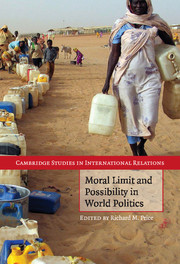Crossref Citations
This Book has been
cited by the following publications. This list is generated based on data provided by Crossref.
Kurki, Milja
2009.
The politics of the philosophy of science.
International Theory,
Vol. 1,
Issue. 3,
p.
440.
Snidal, Duncan
and
Wendt, Alexander
2009.
Why there isInternational Theorynow.
International Theory,
Vol. 1,
Issue. 1,
p.
1.
Reus-Smit, Christian
2009.
Theorising International Society.
p.
58.
Barnett, Michael
2009.
Evolution Without Progress? Humanitarianism in a World of Hurt.
International Organization,
Vol. 63,
Issue. 4,
p.
621.
Risse, Thomas
2010.
Advocacy Organizations and Collective Action.
p.
283.
Welsh, Jennifer M.
2010.
Implementing the “Responsibility to Protect”: Where Expectations Meet Reality.
Ethics & International Affairs,
Vol. 24,
Issue. 4,
p.
415.
Zhang, Juyan
2010.
Exploring rhetoric of public diplomacy in the mixed-motive situation: Using the case of President Obama's ‘nuclear-free world’ speech in Prague.
Place Branding and Public Diplomacy,
Vol. 6,
Issue. 4,
p.
287.
Snyder, Jack
and
Vinjamuri, Leslie
2012.
Principled pragmatism and the logic of consequences.
International Theory,
Vol. 4,
Issue. 3,
p.
434.
Erskine, Toni
2012.
Whose progress, which morals? Constructivism, normative IR theory and the limits and possibilities of studying ethics in world politics.
International Theory,
Vol. 4,
Issue. 3,
p.
449.
Heinze, Eric A.
2013.
Justice, Sustainability, and Security.
p.
1.
McDonald, Matt
2013.
Foreign policy internationalism and political possibility.
International Politics,
Vol. 50,
Issue. 1,
p.
97.
Navari, Cornelia
2013.
Ethical Reasoning in International Affairs.
p.
1.
Reus-Smit, Christian
2013.
Beyond metatheory?.
European Journal of International Relations,
Vol. 19,
Issue. 3,
p.
589.
Dufek, Pavel
2013.
Why strong moral cosmopolitanism requires a world-state.
International Theory,
Vol. 5,
Issue. 2,
p.
177.
2014.
The Status of Law in World Society.
p.
1.
Roach, Steven C.
2014.
Governing Global Democracy.
International Studies Review,
Vol. 16,
Issue. 3,
p.
473.
Lindemann
2014.
Interest, passion, (non)recognition, and wars: a conceptual essay.
Global Discourse,
Vol. 4,
Issue. 4,
p.
483.
Weber, Martin
2014.
Between ‘isses’ and ‘oughts’: IR constructivism, Critical Theory, and the challenge of political philosophy.
European Journal of International Relations,
Vol. 20,
Issue. 2,
p.
516.
McKEOWN, RYDER
2015.
Legal asymmetries in asymmetric war.
Review of International Studies,
Vol. 41,
Issue. 1,
p.
117.
Mörkenstam, Ulf
2015.
Recognitionas ifsovereigns? A procedural understanding of indigenous self-determination.
Citizenship Studies,
Vol. 19,
Issue. 6-7,
p.
634.



